Ricochet is the best place on the internet to discuss the issues of the day, either through commenting on posts or writing your own for our active and dynamic community in a fully moderated environment. In addition, the Ricochet Audio Network offers over 50 original podcasts with new episodes released every day.
 Let’s All Go to the Polling and Get Ourselves Some Facts
Let’s All Go to the Polling and Get Ourselves Some Facts
 There’s been a lot of talk here about the candidates’ characters, legal challenges, personal outlooks towards out-groups, and so on. But, for a moment, let’s step back from emotion and look at something more concrete: polls. National and state polling are still getting their acts together — only Rasmussen is polling on a week-to-week basis for the general election — but we can get a sense of the trend lines to try to understand where the race currently is and how it might proceed from here.
There’s been a lot of talk here about the candidates’ characters, legal challenges, personal outlooks towards out-groups, and so on. But, for a moment, let’s step back from emotion and look at something more concrete: polls. National and state polling are still getting their acts together — only Rasmussen is polling on a week-to-week basis for the general election — but we can get a sense of the trend lines to try to understand where the race currently is and how it might proceed from here.
(A few notes about the polls I’ll be citing, all of which are from Real Clear Politics. In 2008, RCP’s polling average was quite accurate, predicting a 7.6 percent popular vote victory for Barack Obama, who won by 7.3 percent. Despite our head-in-the-sand act four years later, RCP’s polling average correctly called the election, though not as accurately:Tthey projected that the president would win by a mere 0.7 percent; in actuality, he had a 3.9 percent advantage over Mitt Romney.)
Currently, Hillary Clinton holds an averaged 4.7 percent advantage over Donald Trump. If immediate history is any guide, this means that she would win by anywhere from 4.7 to 8 percent if the election was held today. This should be distressing for all center-right voters, although the #NeverTrump among us would be slightly less-dismayed than those at least willing to vote for Trump over Clinton.
General Election
Rasmussen (see below) gives us the most data to work with so we can see a general trend in the polls. Though it shows both candidates rising since the spring, Clinton trends upward more sharply than Trump, which means she probably has a higher ceiling. It should be noted that this includes the only national poll that has shown Trump winning at any point (see data for June 29).
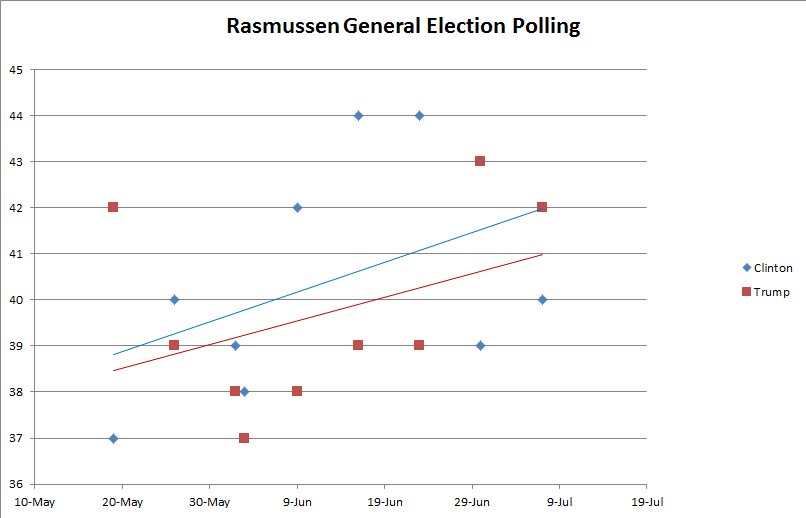
Reuters/Ipsos (below) has conducted only four polls during the same period as Rasmussen’s seven, but is more representative of the overall trend amongst all other polls. They find — I suspect they are correct — that Clinton is slowly climbing while Trump slowly declines:
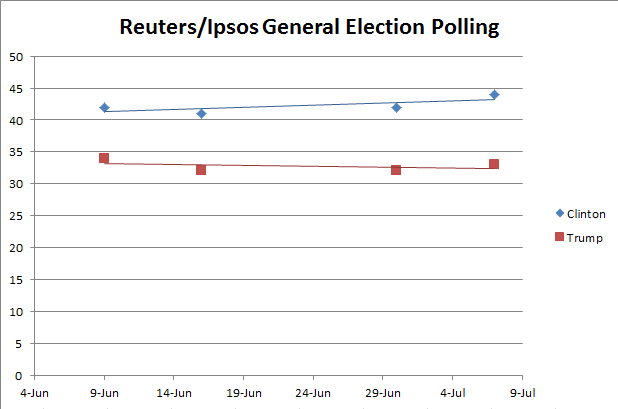
As I said before, only Rasmussen has ever found Trump ahead of Clinton in head-to-head contests. Moreover, no national poll from any source that includes Gary Johnson or Jill Stein has shown Trump victorious since he clinched the GOP nomination. This includes: Gravis, CBS/New York Times, Fox News, NBC/Wall Street Journal, ABC/Washington Post, Quinnipiac, IBD/TIPP, The Guardian/SurveyUSA, Bloomberg, CBS News, CNBC, Monmouth, CNN/ORC, The Economist/YouGOV, PPP, and USA Today/Suffolk.
State Polls
National polling is of use, but a better picture requires us to look at state-level polling. The traditionally important battleground states tell a similarly bleak story for Trump’s chances. In Florida (below), Trump has almost tied Clinton in the last poll. However the last poll, by Gravis, is of registered voters, not likely voters. Clinton has not lost a poll of likely voters in Florida since March:
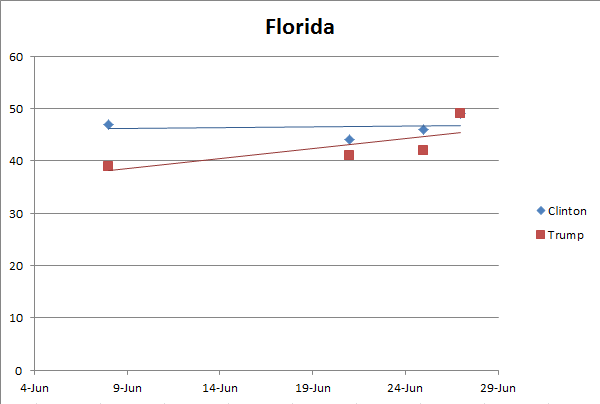
In Ohio, there has only been one poll of likely voters, which Clinton won. Gravis gave Trump his almost-tie at the end of June, but Clinton is up about three points otherwise. At the moment, I’d rate both Ohio and Florida as “lean blue.”
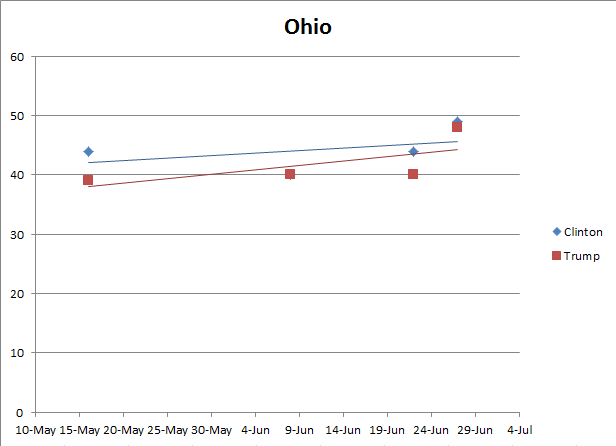 Favorability
Favorability
Our last examination is of the candidates’ favorability ratings. The upshot is that both are underwater, though Clinton’s numbers are, generally, less-bad than Trump’s. Her average unfavorability rating is 15.7 percent higher than her favorability; the former has been relatively flat while the latter has slightly risen. Given the traditional consolidation behind Democratic nominees, we can expect her favorability numbers to continue to rise.
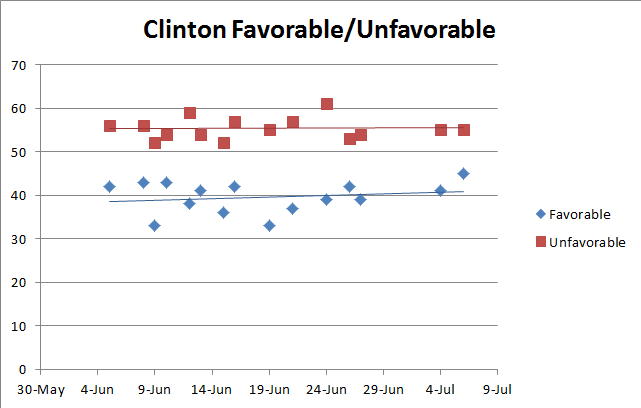
Trump’s numbers are much more volatile. A serious question arises in his numbers: Have we ever seen a nominee whose unfavorability approaches 70 percent? His only hope is that, given a relatively stable sample size, his favorability rating is rising and his unfavorability rating is falling. But given Trump’s flamboyance, lack of a rapid response shop, small campaign size, and the general antagonism between him and traditionally pro-Republican commentators, that may not last.
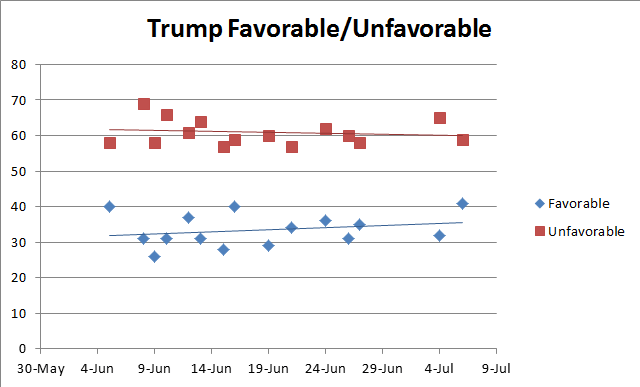
Until more (and better) data becomes available, I am hesitant to draw too many conclusions from all this. However, unless Trump drastically increases his campaign organization’s size and discipline, it seems unlikely he will triumph in November. Based on the data currently available, the RNC should seriously consider unbinding delegates in case the situation deteriorates any further.
Published in General



Two points:
I have a question about undecideds. Are the percentage of undecided voters at this point comparable to the last two cycles?
The running joke is that Hillary has a small lead over Trump with polling coming in at her 14% to his 12%. There may be a large enough pool of undecideds that there is a lot of room for volatility depending on how they break.
Trump supporters, such as I’ve seen, that are actual supporters as opposed to anybody-but-Hillary seem to be in denial about polling results in the same way many Republicans were over the polls in 2012. This is one of the reasons I included the note about RCP’s average compared to actual results. Clearly a good portion of the US does like her for reasons I can’t fathom and that portion of the voting public seems larger than the portion that likes Trump.
Most of the self-identified #NeverTrump contingent I’ve read or talked to argue quite vocally that Hillary is better presidential material than Trump is. While they may not be happy at the prospect of President Hillary Clinton they are almost certainly less unhappy that Trump is losing than those willing to vote for Trump.
Based on my reading of human behavior I’d expect the larger portion of them to break for the presumptive winner of the national vote. At this point that means undecided voters who do vote would vote for Hillary and, probably, Democrats down ticket as well.
As always, I have to quibble with the juxtaposition of the terms “polling” and “facts” in the same sentence. Polling is anything but factual even if it is “data”.
That caveat aside, I think you give a pretty good summary Austin.
My spidey sense is that there’s still lots of room for historically unprecedented behavior this year given the very unusual circumstances, so for me these polls are little more than a weak baseline and not predictive.
In general I agree however polls are at least concrete as opposed to interpretations of motive or sourcing of social media posts. And while we can, and should, cogently argue over how predictive polls are they’re at least there to see and we can talk about something other than the real meaning of Trump’s latest rambling discourse.
I also imagine that the big unknown this year is not swing voters (meaning: unsure whether to vote for Trump or Hillary) but the turnout of partisan but unenthusiastic voters (firmly on one side but not excited enough about their side to actually turn out).
Both Hillary and Trump are loathed by a huge portion of their traditional electorate. At the same time, the fraction of each side which is primarily motivated by hatred of the other candidate seems relatively solid.
In other words, I think everyone whose primary motivation is hatred of Hillary (or Trump) is already baked into this cake, so the unknown variable is not how many more people can Trump recruit against Hillary, but how many Democrats will Hillary lose along the way – not to Trump, but to depression.
No argument with you there.
I should note that personally I doubt turnout numbers for Hillary will be as high as they were for Obama.
Respectfully, you may need to talk with #NTs or read more. I think of the number of #NeverTrumpers willing to vote for Hillary is minuscule. I would contend that the vast majority of #NeverTrumpers find the prospect of a Hillary presidency as terrifying or horrific. The quandary is that they also feel that a Trump administration is potentially equally terrifying or horrific and could result in a more massive and regulatory federal government, massive economic meltdown and/or endanger national security based on his lack of judgment, reckless rhetoric and general ignorance on a whole host of issues, and have no confidence that he will appoint conservative originalists to the Supreme Court or make good on any of his promises.
Hey, I need to at least spend some time pretending to work you know!
I wanted originally to ask another question about whether the polling could reflect non-participation because of discontent with the candidates, but I’m not even sure how to ask it.
I think you are right about people who are motivated as a vote against the other candidate. It’s easy when you only hate one of them. So much not to like. When you hate both…
I think the best we can do in that regard is to compare polling results between polls with registered voters as the sample to polls with likely voters as the sample.
If one candidates numbers are significantly worse in likely voter polls compared to registered voter polls you could try extrapolate the number of disenchanted voters from that differential.
Even if polls did ask that question (and I imagine there are a few which do), I wouldn’t put any faith in the answers. I don’t think people know themselves well enough to accurately predict how strong their motivation will be in 5 months.
Specifically, there are a lot of both traditional Republican and Democrat voters currently saying they’ll stay at home because they’re so dissatisfied with their party’s nominee. I am quite confident that a large number of these cohorts will show up and pull the lever for their party’s candidate after all come election day.
Why? Because we’re all creatures of habit, partisans are trained to think the other party’s candidate is the worst thing since processed bread, and there’s enough time for them to go through the Kübler-Ross stages of grief that they will have reached the acceptance stage by November.
And get ourselves some facts,
And get ourselves some facts…
Used to sing to my infant son:
Let’s go into the shower,
And take ourselves a bath!
Thank goodness someone picked up on the title (and commented on it).
I sure wish Brexit had won.
I’m not sure British and American pollsters have the same quality or the same response level.
Given the historical accuracy of RCP’s polling average versus actual election results I think using polls to discuss the state of the race is appropriate. This primary cycle saw the same error from candidates that the GOP had in 2012’s general election: apparent wishful thinking unsupported or contradicted by public polling.
It’s possible Rubio’s campaign, Jeb’s campaign, Christie’s campaign, Kasich’s campaign…well everyone but Trump’s campaign really had internal polling giving them hope but frankly I doubt it.
Polling has been off on both sides of the sea for some time now. I am not expecting Trump to win, so please don’t read it that way.
Best I can tell, though, polling is not all that accurate any longer, based on the past decade.
I’d agree with the statement that polling certainly seems less accurate. I wonder how much of that is related to media trust.
A poll (circular reasoning, I know) stated about 6% of people had “a lot of confidence” in the media to get a story right. Since pollsters are often related to media organizations you have to wonder how many people refuse to answer or give misleading answers to polls.
Especially since the mainstream media’s narrative about Trump hasn’t really turned yet. I expect that to happen after the convention and predict that’s when the demonization will really start. Suddenly, he’ll become a bumbling idiot who doesn’t know the first thing about government and how dangerous it would be to put him in the Oval Office. Would you really want to put someone in the Office who spouts off like that?
After 3-4 months of that kind of talk, it’ll be interesting to see how the polls stand. I’m not convinced Trump will survive it.
I think the modern-day Bradley effect explains why so many polls have been skewed Left of late, but I can’t imagine it being significant enough to swing the election to Trump. Yes the media’s demonization of all Trump supporters as sick degenerate bigots will make some people skittish about admitting their voting preference to pollsters, but not near enough to swing the election.
Also, I want to stress that as a NeverTrump type, the prospect of a Hillary presidency makes me feel physically ill. I felt really shaken after Comey’s press conference earlier this week; I am a thousand miles from “less distressed”. My unwillingness to back the biggest anti-Clinton candidate should not lead you to infer that I like Hillary any more than you do, but that I am that unable to stomach Trump.
“Less distressed” means just that, I wasn’t trying to imply they’re eager or happy about it. There’s a reason that Ben Sasse’s office described the whole thing as a dumpster fire.
Do either of you have any evidence that polling is less accurate now (and whether the meta-analyses currently used are less accurate)?
My gut instinct is that on the aggregate, polling is just as (im)precise as it has been during our lifetimes, but not that it’s gotten worse. Rather, I think it’s been a fairly rough and inaccurate tool from day one, and our sense that it’s gotten worse is a projection of our own general disappointment with both the press and with the results of polls (and elections).
Polling quality in the US and UK is very different, with the US have much more accurate polling. The relatively poor quality of British polling is something the British press is pretty cognizant of there are a number of prominent pollsters and analysts on both sides of the Atlantic who have examined the reason US polls do so much better than UK polls. In the lead up to the Brexit vote, I believe Nate Silver gave at least one interview in which he stressed to American pundits that they should keep in mind the relative unreliability of UK polling.
I also think we dump on polls too much.
Electoral polling tries to do the impossible – predict the behavior of a huge group of people – yet we don’t pay a dime for it. Anyone with a smidgen of free market sense would call that a recipe for poor quality.
Sure, we can harp on the media for overselling polls. But caveat emptor remains the overarching commandment – as consumers, our awareness that polls will never be consistently accurate should be strong enough to automatically drown out the over-hyped marketing of the outlets plugging the polls.
Not really, although it does seem that way to me. Maybe I pay more attention to details now than I did so that may be why I notice discrepancies.
Regardless of general accuracy I think they still give us useful information regarding the state of the race: I’ve written several posts this political season about what the polls tell us thanks to inspiration from Ricochet’s Own™ Majestyk.
Sadly that hasn’t gotten me any TV appearances. Maybe I should ease up on the post-apocalypse stuff – I could be scaring the straights.
Agreed. Though I think you understate the quality of the polling. The polling this election cycle has actually been very accurate (the Michigan Democratic primary been the notable example of polling getting things seriously wrong).
There is a general trend that the closer one gets to the actual statisticians, the more honest they are about the shortcomings of their own methods.
Yet most of us don’t read the primary sources written by the pollsters, we read some analysis by the large media outlet who commissioned the poll – or worse, some thumbsucking pundit who simply read the headline figures from that outlet.